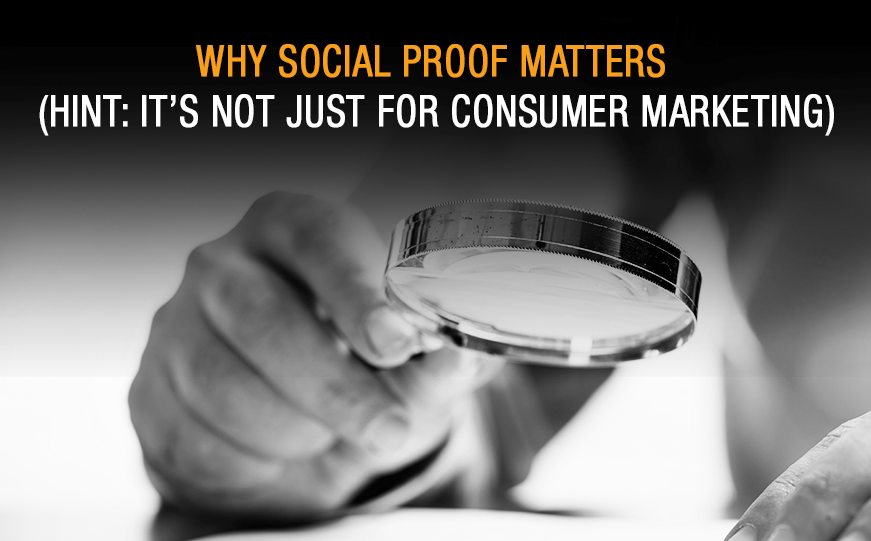Social proof is a term coined in 1984 by author Robert Cialdini in his book Influence: The Psychology of Persuasion. It’s a phrase that describes the power of social influence.
In Cialdini’s words, “The greater the number of people who find an idea correct, the more the idea will be correct.”
From a behavioralist’s perspective, it’s the observation that audiences tend to mirror the actions of others… when they find themselves in unfamiliar situations.
In marketing, social proof refers to a similar concept: that often, prior to making a purchase — audiences will seek out reviews, recommendations and influence from opinion leaders.
In an effort to gain further confidence. And help validate their decision.
Social proof occurs when a channel expert provides a testimonial. And demonstrates that they trust a brand… by talking about it positively online.
Often, it’s in the form of a case study program — featuring satisfied customers who rely on a dependable Building Product Brand — to solve a particular challenge. Or to explain how a differentiated product offering can create opportunities to build their business.
Even a brand’s logo — that appears on a partner’s website — can be thought of as social proof.
Following are some popular strategies that Building Product Brands can leverage to build social proof.
Solicit customer testimonials and reviews
A marketing study from Accenture showed that 94 percent of B2B clients research a product or service at some point in their customer journey… typically by seeking reviews and testimonials.
We make it a practice in our client engagements to solicit channel opinions — as well as develop rating scores — for brands. And to research audience experiences using various products or solutions.
As influencer campaigns lead to positive brand experiences, we help brands develop written and video testimonials to promote those successes. It’s a valuable strategy designed to earn authority and trust. Which helps us create a more distinct brand promise, that can be leveraged early in each sales journey.
Develop case studies
Case studies clearly demonstrate social proof. This longer form content — based on a customer’s direct experience — is typically viewed as more reputable and authoritative than traditional, shameless self-promotion.
It’s helpful to think of case studies as marketing “destinations”, designed to draw in a prospect… after they’ve already shown initial interest. By describing a recurring challenge that audiences face — along with how a company’s product or service assisted in overcoming that challenge — case studies provide relatable, and highly relevant, real-world demonstrations.
Showcase industry affiliations
To target regional opportunities, we recommend designing brand experiences for industry associations and local trade events.
For example, become a speaker or sponsor for programs like NARI (National Association of Remodeling Industry) Nights and builder previews for decorator show homes… and promote your brand’s participation in those events. Highlight industry awards and other recognitions. Include relevant trade association and award logos in outbound communications. And share on social platforms.
Respond to comments and questions online
Audience engagement and social listening help to develop social proof. Whenever someone comments about a brand experience (positive or negative), it’s critical to respond as quickly — and as thoughtfully — as possible.
Addressing comments in an understanding, caring and confident posture will help to create a positive brand impression… aimed at prospects, who likely are watching the exchange.
Engage with influencers
Product integrations and influencer programs are designed to feature Building Product Brands in media channels and within distributed video content… to create social proof. There are a host of industry bloggers at every budget level, to consider. Along with user-generated content, to solicit. After all, when a brand receives an endorsement from a credible source, prospective customers are more likely to trust and support the brand and its offerings.
Leverage press mentions
As brands earn return-on-investment from PR efforts — in print or online publications — it’s important to share those results with customers and prospects.
Media coverage is an important way to build awareness and authority. And the momentum gained helps to keep the doors open for future PR opportunities. After all, editors and influences tend to cover brands and products that they already know about.
The proof is in the results
Social proof occurs when audiences recognize that architects, end users and industry influencers have had positive experiences with a brand. Audiences will, in turn, desire that same confidence.
Ready to start in the new year building more brand equity… by generating social proof? Consider partnering with an agency that has an established network of media and influencer contacts. Send an e-mail to sk@kleberandassociates.com to get the conversation started.




